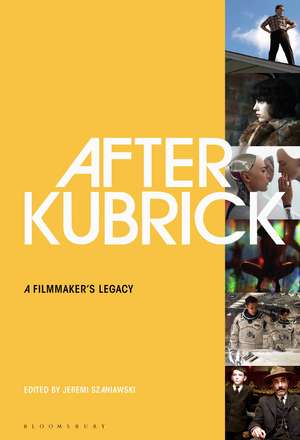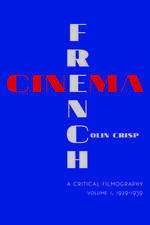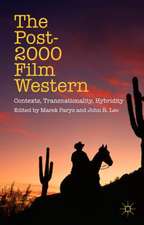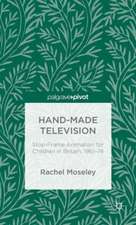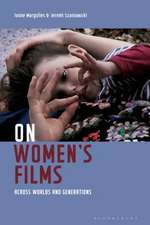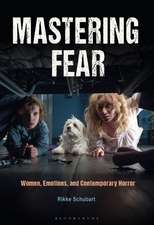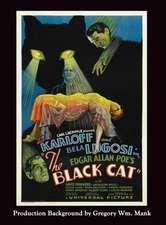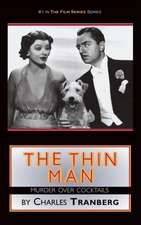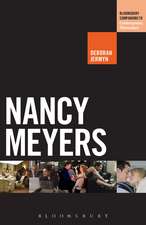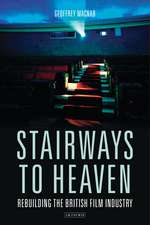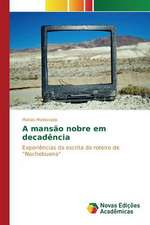After Kubrick: A Filmmaker’s Legacy
Editat de Professor Jeremi Szaniawskien Limba Engleză Paperback – 25 aug 2021
| Toate formatele și edițiile | Preț | Express |
|---|---|---|
| Paperback (1) | 219.39 lei 6-8 săpt. | |
| Bloomsbury Publishing – 25 aug 2021 | 219.39 lei 6-8 săpt. | |
| Hardback (1) | 716.73 lei 6-8 săpt. | |
| Bloomsbury Publishing – 19 feb 2020 | 716.73 lei 6-8 săpt. |
Preț: 219.39 lei
Preț vechi: 275.77 lei
-20% Nou
Puncte Express: 329
Preț estimativ în valută:
41.98€ • 43.83$ • 34.74£
41.98€ • 43.83$ • 34.74£
Carte tipărită la comandă
Livrare economică 04-18 aprilie
Preluare comenzi: 021 569.72.76
Specificații
ISBN-13: 9781501383557
ISBN-10: 1501383558
Pagini: 320
Ilustrații: 42 bw illus
Dimensiuni: 152 x 229 x 22 mm
Greutate: 0.43 kg
Editura: Bloomsbury Publishing
Colecția Bloomsbury Academic
Locul publicării:New York, United States
ISBN-10: 1501383558
Pagini: 320
Ilustrații: 42 bw illus
Dimensiuni: 152 x 229 x 22 mm
Greutate: 0.43 kg
Editura: Bloomsbury Publishing
Colecția Bloomsbury Academic
Locul publicării:New York, United States
Caracteristici
The first comprehensive and scholarly assessment of Kubrickian heirs and followers
Notă biografică
Jeremi Szaniawski is Assistant Professor of comparative literature and film studies in the Department of Languages, Literatures, and Cultures at the University of Massachusetts Amherst, USA. He is the editor of Directory of World Cinema: Belgium and the author of The Cinema of Alexander Sokurov: Figures of Paradox (both 2014), as well as the translator, into French, of Thomas Elsaesser's and Malte Hagener's Film Theory: An Introduction Through the Senses (2011) and Alexander Sokurov's V tsentre okeana (2015).
Cuprins
Introduction: 1999-2019, and Beyond: A Post-Kubrickian Odyssey (Jeremi Szaniawski, UMass Amherst, USA)1. Stanley Kubrick's Prototypes: the Author as World-Maker (Thomas Elsaesser, University of Amsterdam, the Netherlands)2. "Kubrick's Cube": Stanley Kubrick, Judaism and his Jewish Heirs (Nathan Abrams, Bangor University, UK)3. Kubrick's Inheritors: Aesthetics, Independence, and Philosophy in the Films of Joel and Ethan Coen (Rodney F Hill, Hofstra University, USA)4. Blurring the Lines between Victim and Perpetrator: Yorgos Lanthimos and Stanley Kubrick's legacy (Pierre Simon Gutman, ESRA, France)5. Glimpses of Eternity: Stanley Kubrick's Time Machines (Jeremi Szaniawski, UMass Amherst, USA)6. Kubrickian Dread: Echoes of 2001 and The Shining in Works by Jonathan Glazer, Paul Thomas Anderson, and David Lynch (Rick Warner, UNC Chapel Hill, USA)7. Excessive and Incomplete: Kubrick's Turing (Marta Figlerowicz, Yale University, USA)8. Thus Spoke Kubrick: "Guide Pieces," Modes of Citation and the Rise of the Temp Track (Adrian Daub, Stanford University, USA)9. Fade to Crude: Petro-Horror and Kubrick's The Shining (Pansy Duncan, Massey University, New Zealand)10. The Anxiety of Interpretation: The Shining, Room 237I, and Film Criticism (Daniel Fairfax, Frankfurt am Main University, Germany)11. Political Opacity in the Films of Stanley Kubrick (John Pitseys, Université Catholique de Louvain-la-Neuve, France)12. Coping with the Unknown in 2001: A Space Odyssey and Interstellar (Mircea Deaca, University of Bucarest, Romania)13. Biopolitical Abjection and Sexuation: Stanley Kubrick's Political Films (Seung-hoon Jeong, NYU Abu Dhabi, United Arab Emirates)14. Kubrick at the Museum: Post-cinematic Conditions, Limitations, and Possibilities (Jihoon Kim, Chung-Ang University, South Korea)15. The Dead Kitten: Sacrifice in Barry Lyndon (Alexander Nemerov, Stanford University, USA) Appendix: Interview with Gaspar Noé (Pip Chodorov, Dong-Guk University, South Korea)Index
Recenzii
[T]reads new ground in Kubrick-ademia.
Here is a collection of lambently written and fascinating explorations of an important filmmaker's scintillating career. Admirers and students will rightfully cherish After Kubrick for its unprecedented depth, its smart variety of approaches, and the intense light it shines on films that have become classics.
These fascinating, often ingenious, and always insightful essays explore the complex legacy of one of the great artists of the 20th century.
Never sentimental, fawning, or uncritical, this collection tackles the complex subject of the legacy of Kubrick's films with the most promiscuous possible sense of aesthetic influence. Kubrick, or, rather, 'Kubrick,' thereby becomes a machine, a form, a process, a method, a medium, an excuse, a vibrant philosophical conceit, enabling the revisiting of some of the most pressing contemporary debates in the study of representation-the aesthetic status of affect; the post- and trans-human relation to technology and artificial intelligence; environmental catastrophe and the machinery of war; in addition to film-philosophical concerns with cinematic time; the grotesque and violent; and the status of aesthetic form itself. Grounding its far-reaching considerations in exemplary close readings, and with a particularly rich editorial introduction, After Kubrick thereby brings out the etymological debt of the word 'influence' itself: from the Latin influere, to flow into, an undetermined streaming of energy, fluid, or even unobservable forces, demonstrating that aesthetic influence is the unpredictable and impersonal capacity to produce new and surprising effects.
After Kubrick represents an infusion of rich blood into Kubrick studies and contemporary cinema studies. Contributing authors are among the finest in those fields, but this volume is not a collection of "the usual Kubrick suspects": it extends much further than that in its inclusiveness and in its ambitious scope to cut new pathways back into Kubrick's work and forward into emergent work.
Here is a collection of lambently written and fascinating explorations of an important filmmaker's scintillating career. Admirers and students will rightfully cherish After Kubrick for its unprecedented depth, its smart variety of approaches, and the intense light it shines on films that have become classics.
These fascinating, often ingenious, and always insightful essays explore the complex legacy of one of the great artists of the 20th century.
Never sentimental, fawning, or uncritical, this collection tackles the complex subject of the legacy of Kubrick's films with the most promiscuous possible sense of aesthetic influence. Kubrick, or, rather, 'Kubrick,' thereby becomes a machine, a form, a process, a method, a medium, an excuse, a vibrant philosophical conceit, enabling the revisiting of some of the most pressing contemporary debates in the study of representation-the aesthetic status of affect; the post- and trans-human relation to technology and artificial intelligence; environmental catastrophe and the machinery of war; in addition to film-philosophical concerns with cinematic time; the grotesque and violent; and the status of aesthetic form itself. Grounding its far-reaching considerations in exemplary close readings, and with a particularly rich editorial introduction, After Kubrick thereby brings out the etymological debt of the word 'influence' itself: from the Latin influere, to flow into, an undetermined streaming of energy, fluid, or even unobservable forces, demonstrating that aesthetic influence is the unpredictable and impersonal capacity to produce new and surprising effects.
After Kubrick represents an infusion of rich blood into Kubrick studies and contemporary cinema studies. Contributing authors are among the finest in those fields, but this volume is not a collection of "the usual Kubrick suspects": it extends much further than that in its inclusiveness and in its ambitious scope to cut new pathways back into Kubrick's work and forward into emergent work.
